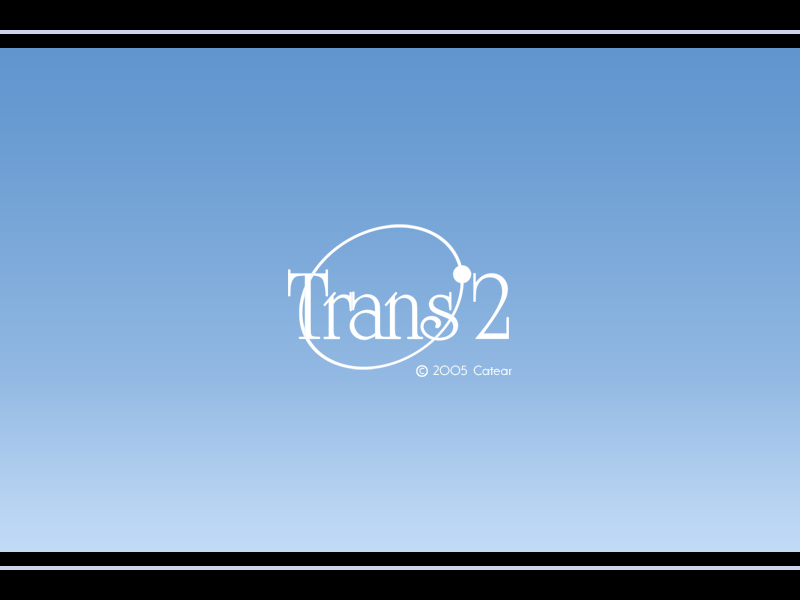overlapping (through) translation – 「TRANS’2 ~私とあたしと翻訳と~」

“Learning about translation on the job, I came to think that it would be a practical help if one’s relationship with the language was such that sometimes one preferred to speak in it about intimate things.”
- Gayatri Spivak, The Politics of Translation
I don’t open with a deeply uncontroversial assessment from Spivak to grant whatever I say here with some easy sense of authority but to contextualise my personal act of “reading” Trans’2 ~僕とあたしと恋人と~, the 2005 erotic 女装シミュレーションゲーム from doujin circle and 女装goods shop Catear. I don’t entirely subscribe to the notion that, to quote Sontag somewhat out of context here, “the task of interpretation is virtually one of translation.” I wish to speak of translation as a bare “corporeal” exercise rather than an intellectual one of hermeneutics. I continue to “interpret” the game despite my failures to “translate” it. “Translating” Trans’2 as I speak of here often to me meant, due to the lack of voice acting in the game and my substandard language skills, approaching a whole line and discovering that I was unable to “read” a certain character and whipping out Google Lens, highlighting the text, inputting it into a dictionary, adding it to my deck of flashcards, rinse and repeat. Under Spivak’s observations, my translation of Trans’2 for which both translator and audience is simply myself is not optimal. I do not speak of intimate things in Japanese, clearly, if reading a largely functional text requires constant consultation with the collective knowledge of humanity accessed through the machine. This does mean that my “reading” of such an intimate game as Trans’2 is, is fundamentally limited – if I were to actually agree that it is an intimate text, or if through some fault within myself or the game it failed to be intimate.

Trans’2, though not a very deliberately and intently constructed work of prose fiction, often returned to a single verb in its more emotionally charged scenes - 「重なる」(to overlap). As such I think “overlapping” in its many senses is to be taken as an anchor point in the game. Many things overlapped in Trans’2 – lipstick overlaps on drink glasses, saliva overlaps lips, eventually bodies and various fluids overlap each other and, in the game’s most personally affecting scene, “I (feminine casual) was overlapping the shape of my old self onto that boy”. That last use of 重なていた, revealing that “to overlap” meant more than an “overlap” of bodies and fluids, breaks through. There is an overlapping of expectations, desires, realities, experiences to consider, both intratextually as protagonist Shinobu overlaps ‘her’ old shape onto ‘that boy’ and paratextually, I overlap my desires and expectations onto a work existing within an unfamiliar discourse that is almost certainly outdated in many regards considering the decade and a half of removal from the game’s publishing to my attempts at “reading” it. Translation, in its most simplistic of understandings, is an overlap of meanings across often radically different signification systems. I retain 女装 as 女装 as I write this because I do not want to overlap any expectations and meanings I can ascertain from it into any notions that may exist in the signification system we call “English”. But my act of relying on the machine to “read” the text, a process that was enabled to be developed through an absorption of methods and assumptions made and used in our societies where it is transgressive to “cross” something that we may call “gender”, means that even if it is not a perfect circle, the terms “crossdressing” and “transvestitism” would inevitably overlap themselves upon it regardless of how much effort I exert to only read 女装 as 女装 with all the possibilities of ‘masculine to feminine’ expression that exists within the linguistic space where 女装 doesn’t overlap with “transvestitism”. Yet 女装 concurrently fails to overlap perfectly onto whatever concept that exists in my imaginary that means the term 女装 in Japanese because I fail to completely overlap the Japanese text in its entirety onto the world of concepts. Whether its me forgetting what 唇 means in the middle of an erotic scene or having to look up common words unconventionally written in kanji when they are usually written in kana, the layer of the physical act of “translation” prevents a complete conceptual overlap in “reading” Trans’2 as I play it. I am interrogated by a failure of “reading”, so that I must rely on “translation”, that inevitably failing overlapping of linguistic lips. And here, having failed to overlap, I must take a few steps back and consider “overlapping” in the context of my self.
As someone who considers themselves “bilingual+” as it were, not confident enough to suggest that I am fluent in more than two languages to be tri or quadrilingual, language is the cause of many internal crises. I feel myself constructing myself every time I think and speak. In a lot of ways, I only consider myself to be extant in English. Other languages I speak are functional or transactional, and in many ways, I believe I only have “gender” in English. The “foreigner” in Japan has very few opportunities to whip out a 僕 or 俺, to establish their own casual masculinity. Ideally this must mean that I feel extraordinary comfort in the formal feminine-leaning neutrality of 私or that I yearn to shout out an あたし into the world, or to sublimate the usual わ into an あ so I can sneakily establish that I am transgressing the norms of gendered society. Yet I feel no such thing! I feel that I am not a gendered being outside of the signification systems of “English”, and this is not a statement to be read in an oppressed tone, I love the gendering I feel in “English”, the feeling that I constructed that feeling, that I construct that feeling. Where does this leave my reading of Trans’2?

When Shinobu attends a cooking class with ‘her’ (I choose to leave ‘her’ in quotation marks continually because Shinobu uses あたし in a performatively jocular manner, not to disrespect or assign ‘her’ a gender that the game does not) senpai Rei, the script eventually reaches the line “Rei-chan is looking sharply at me as if wanting to lick me all over”, I immediately glibly posted that line on twitter captioning it “I would like that actually”. I would – Rei is very attractive! But when I say “I would like that actually” do I mean “I would like that actually” (“English”) or something like「本当に要ります」(“Japanese”). Was I able to overlap my desires and expectations on to Shinobu’s obvious attraction to Rei? Was I able to translate and develop a consciousness in “Japanese”, so I could perform the intimacy the game so desires from its “reader”? I just do not have any of these answers, so my interpretation remains stagnant, as a hesitant failed “translator” rather than as a true “reader”.